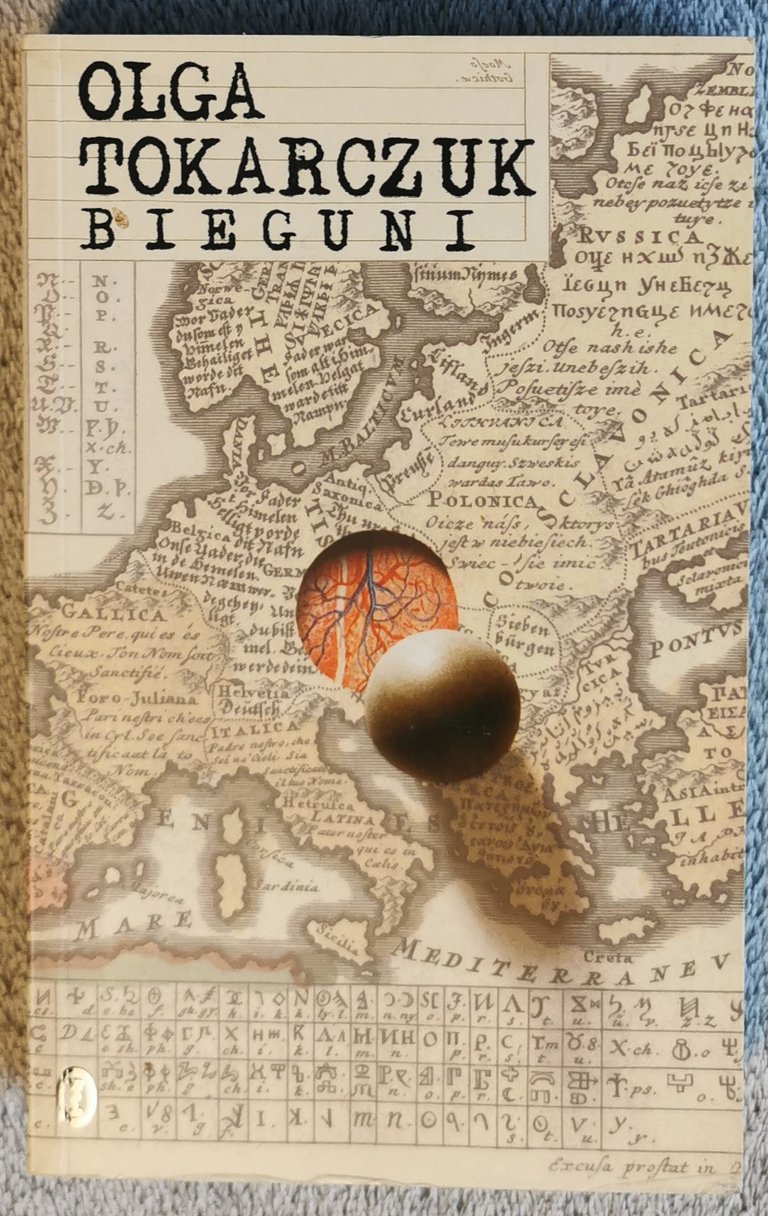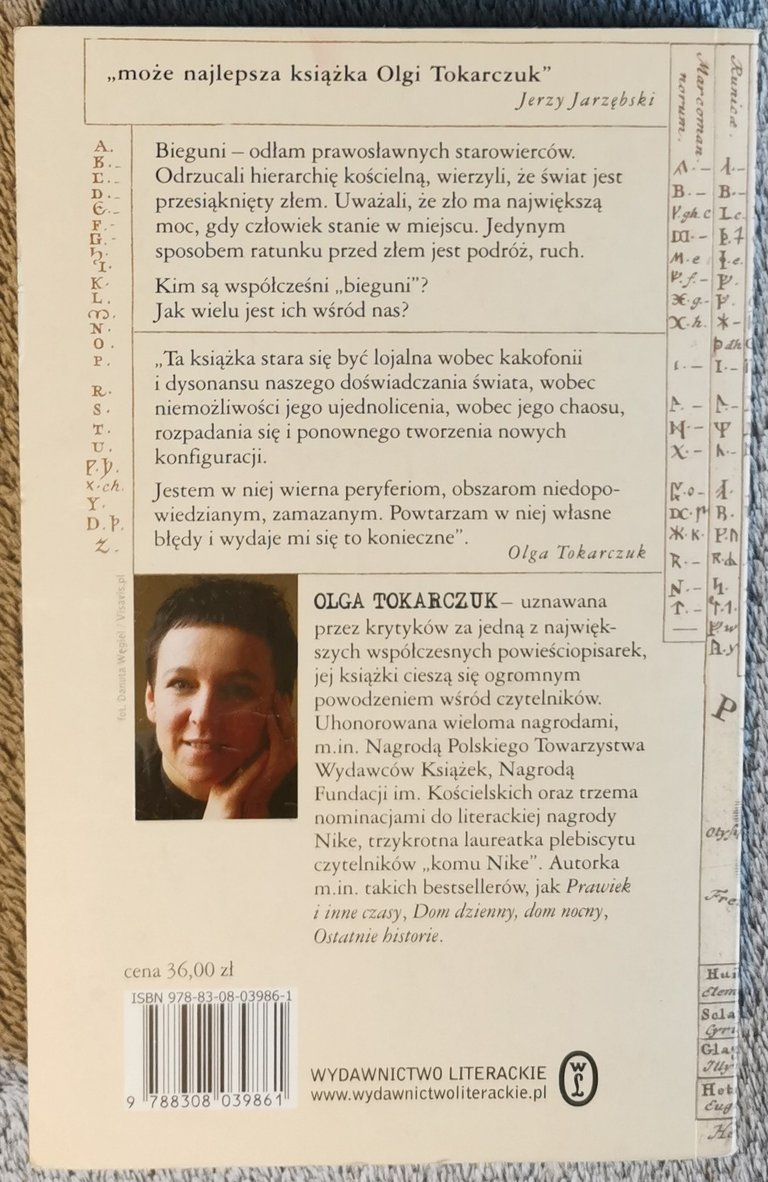
| „Bieguni”. Olga Tokarczuk. Autorka – klasy światowej, noblistka. Więc i oczekiwania od książki już na samym starcie są wysokie. Że nie będzie to byle jakie czytadło, o którym zapomni się tuż po zamknięciu okładki, ale jednak książka, która nie tylko przyniesie radość z lektury, ale też utkwi w pamięci na dłużej, pobudzi do myślenia, wytworzy jakąś „wartość dodaną”. A jak to wyszło w moim przypadku? |
'Flights'. Olga Tokarczuk. A world-class writer, a Nobel Prize winner. So expectations of the book are high from the start. We expect the book not to be just another read that we will forget as soon as we close the cover, but a book that will not only give us pleasure while reading, but also stay in our memory for a long time, make us think, create some kind of 'added value'. And how did it work in my case? |
| Cóż. Zacznijmy od postawienia sprawy jasno. Jeśli czytelnik spodziewa się powieści o złożonej, głębokiej fabule, względnie wartkiej akcji trzymającej w napięciu aż do ostatniej strony – rozczaruje się. To nie ten rodzaj literatury. Rozdziały, o ile w ogóle można mówić o rozdziałach, są krótkie, czasami nawet jedynie półstronicowe. Rzadko tworzą spójną serię, częściej stanowią przeplatankę wątków porozrzucanych po całej książce. Jednak uważny czytelnik będzie w stanie odnaleźć się w tym pozornym chaosie, pozbierać poszczególne fragmenty rozsypanych historii i docenić talent autorki. |
Well, let's be clear from the start. If the reader is expecting a novel with a complex, deep plot, or a fast-paced plot that will keep the reader on the edge of their seat until the very last page - they are going to be disappointed. This is not that kind of literature. The chapters, if you can call them chapters, are short, sometimes only half a page long. Rarely do they form a coherent series, more often they are an interweaving of threads scattered throughout the book. However, an attentive reader will be able to find his way through this apparent chaos, pick up the various fragments of the scattered stories and appreciate the author's talent. |
| Oczywiście, motywem przewodnim jest wędrówka, podróż, przemieszczanie się. Nieprzypadkowo – tytułowi „bieguni” to odłam prawosławnych starowierców, którzy wierzyli, że tylko ruch może przynieść ratunek przed złem – najpotężniejszym, gdy człowiek stanie w miejscu, zapuści korzenie. Jednak samych biegunów na kartach książki nie znajdziemy (chyba, że w ilościach śladowych, które nie zapadły mi w pamięć). A co zapadło? |
The leitmotif is, of course, wandering, travelling, moving. Not coincidentally - the 'Bieguni' of the original Polish title are 'runaways', a faction of Russian Orthodox Old Believers who believed that only movement could save one from evil - which is most powerful when one stands still and puts down roots. The runaways themselves, however, are nowhere to be found in the pages of the book (except perhaps in traces, which did not sink in for me). And what did? |
| Przede wszystkim – obfitość króciutkich całości, stanowiących wspomnienia narratorki z jej różnych podróży lub rozważania na temat tychże. Rzadko kiedy powiązanych ze sobą. Znajdzie się wśród nich i historia o tym, jak podczas któregoś lotu czytała instrukcje montażu przydomowych basenów, i o tym, że ktoś, kto nie lubi podróżować sam, nie nadaje się na pielgrzyma, o spotkanym w Czechach serbskim autostopowiczu, o pogo wśród ortodoksyjnych żydów… Wielka różnorodność, która potrafi zaintrygować i podsunąć ciekawe myśli, ale potrafi także zirytować – jak dwuzdaniowy „rozdział” o spędzonym w samolocie pewnym kwadransie, który na jej oko trwał godzinę lub dłużej. |
First and foremost - the abundance of short wholes, representing the narrator's memories of her various journeys or reflections on them. Rarely connected. There is the story of reading instructions for assembling a swimming pool on one of her flights, the story of how someone who does not like travelling alone is not suitable as a pilgrim, the story of a Serbian hitchhiker she met in the Czech Republic, the pogo among Orthodox Jews... It is a wide variety that can intrigue and provoke interesting thoughts, but also irritate - like a two-sentence 'chapter' about a certain quarter of an hour spent on a plane that seemed to her to last an hour or more. |
| Drugim z motywów przewodnich jest wątek szeroko pojętego dążenia do utrwalenia i uwiecznienia kruchego ciała ludzkiego. Stanowi on bazę kilku dłuższych historii, podczas których Czytelnik odbywa podróż w czasie, towarzysząc między innymi anatomowi Filipowi Verheyenowi, wędruje wraz z kolekcją preparatów Ruyscha, zakupioną przez Piotra Wielkiego, współczuje Józefinie Soliman, uparcie proszącą austriackiego cesarza, by ten raczył uwolnić jej czarnoskórego ojca od losu eksponatu w gabinecie osobliwości i zezwolił na jego godny pochówek… Pojawia się też epizod współczesny w postaci doktora Blaua i jego dążenia do pozyskania tajemnicy idealnego płynu konserwującego – czy jednak będzie gotów zapłacić cenę, wyznaczoną przez wdowę po profesorze Mole’u, który ten płyn wynalazł? Do tej grupy można by też zaliczyć historię przemytu serca Chopina z Francji do okupowanej przez zaborców Polski. Oczywiście, motyw ciała i jego utrwalania pojawia się także we wspomnianych już wcześniej krótszych całostkach. |
The second leitmotif is the broadly defined quest to perpetuate and immortalise the fragile human body. It forms the basis of several longer stories in which the reader is taken on a journey back in time. They accompany, among others, the anatomist Philip Verheyen in his research, they observe the travel of the collection of Ruysch's specimens purchased by Peter the Great, they sympathise with Josephine Soliman as she persistently begs the Austrian Emperor to deign to liberate her deceased black father from the fate of an exhibit in the Cabinet of Curiosities and allow him a respectful burial... There is also a contemporary episode in the form of Dr Blau and his search for the secret of the perfect preservative - but will he be willing to pay the price set by the widow of Professor Mole, the man who invented the liquid? The story of the smuggling of Chopin's heart from France to Poland, occupied by the partitioning powers, could also be included in this group. Of course, the motif of the body and its perpetuation also appears in the shorter parts mentioned above. |
| Trzeci motyw, a w zasadzie grupa tematyczna, to kolejne dłuższe historie, w zasadzie niepowiązane ze sobą niczym szczególnym – oprócz samego motywu wędrówki (choć może część czytelników takie powiązania dostrzeże?). A zatem w podróżach towarzyszami naszymi będą, na przykład: Eryk – były wielorybnik i przemytnik, obecnie sternik promu pasażerskiego na króciutkiej linii między dwiema wyspami – porwany pewnego dnia przez zew morza; Zajmująca się odkrywaniem trucizn biolożka, która wyrusza w podróż na drugi koniec świata tylko po to, by wyświadczyć przysługę niewidzianemu od trzech dekad ukochanemu sprzed lat; Annuszka – żona i matka, podróżująca metrem w próbie ucieczki przed życiem ze zdemobilizowanym mężem i chorym synem; Pewien sułtan stający przed koniecznością ratującej życie ucieczki z pałacu – i porzucenia tego, co dla niego najcenniejsze; Niejaki Kunicki, którego żona zagubiła się na chorwackiej wyspie Vis; 80-letni profesor, który co roku wyrusza w rejs po greckich wyspach, by wygłaszać wykłady pasażerom luksusowego statku. I Kairos, zapomniany helleński bożek przelotnej szansy, który w pewien sposób wiąże go z Kunickim. A także wykładowcy, wygłaszający swe psychologiczne wykłady na lotniskach – dla pasażerów oczekujących na swoje loty. |
The third theme, or group of themes, is a series of longer stories that are basically unconnected - apart from the wandering theme itself (although some readers might see such connections?). For example, our travelling companions will be: Eric - a former whaler and smuggler, now helmsman of a passenger ferry on a short route between two islands - one day overtaken by the call of the sea; A biologist who works on discovering poisons, setting off on a journey to the other side of the world just to do a favour for her long-lost lover from three decades ago; Annushka, a wife and mother who travels underground to escape her life with a demobilised husband and disabled son; A sultan who must make a life-saving escape from his palace - and give up what is most precious to him; A certain Kunicki, whose wife has gone missing on the Croatian island of Vis; An 80-year-old professor who sets out every year on a cruise around the Greek islands to give lectures to the passengers of a luxury liner. And Kairos, the forgotten Hellenic idol of fleeting chance, who somehow binds him and Kunicki together. Also the lecturers who give their psychological lectures at airports - to passengers waiting for their flights. |
| To wszystko sprawia, że czytanie „Biegunów” nie należy do rzeczy łatwych. Częściowo ze względu na tę chaotyczną przemienność, częściowo na niemałą dawkę erudycji, którą czytelnik powinien się charakteryzować by móc w pełni się delektować dostarczanymi przez autorkę treściami. Z drugiej strony, nawet dla dobrze wykształconej osoby „Bieguni” stwarzają możliwość, by dowiedzieć się czegoś nowego, poszerzyć swoją wiedzę z dziedzin, w których nie jest się ekspertem – i przyznaję się, że ja sam uważam, że wędrując przez karty książki dowiedziałem się paru nowych rzeczy. A to zawsze liczy się na plus! |
All this makes reading 'Flights' no easy task. Partly because of this chaotic mixture, partly because of the not inconsiderable amount of erudition the reader must possess in order to fully enjoy what the author has to offer. On the other hand, 'Flights' is an opportunity for even a well-educated person to learn something new, to broaden their knowledge in areas in which they are not experts - and I confess that I found myself learning a few new things as I wandered through the pages of the book. And that always counts as a plus! |
| Podsumowując – jest to dobra i wartościowa lektura, a jednak nie dla każdego czytelnika. Również z tego powodu waham się, jaka powinna być sprawiedliwa ocena końcowa. Gdyby oceniać tylko te krótkie całostki, dałbym maksymalnie ocenę dobrą - 7 na 10. Jeśli liczyć tylko dłuższe historie, w których autorka sprawdza się znakomicie, śmiało dałbym co najmniej 9 na 10, rewelacyjną. Ale na całą książkę to jednak dla mnie troszkę za dużo – niewątpliwie zapada w pamięć, niemniej czy będzie zachęcać do regularnego i częstego wracania do niej? Czy raczej będzie to książka z gatunku: przeczytać, zapamiętać co nieco, odłożyć na półkę i wrócić za kilka(naście) lat? Myślę, że krakowskim targiem zaproponuję 8,5 i tego będę się trzymał, jednocześnie zachęcając każdego, żeby wyrobił sobie własną opinię. Bo na pewno warto. |
All in all - a good and worthwhile read, but not for every reader. For this reason, too, I hesitate as to what a fair final rating should be. If I were to rate only the short wholes, I would give a maximum rating of good - 7 out of 10. If I were to count only the longer stories, in which the author excels, I would boldly give at least a 9 out of 10, awesome. But for a whole book it is a bit too much for me - it is undoubtedly memorable, but will it encourage you to return to it regularly and often? Or will it be more of a 'read it, remember something, put it back on the shelf and come back in a few years' time' kind of book? I think as a compromise I'll suggest an 8.5 and stick to that, while encouraging everyone to make up their own minds. Because it's definitely worth it. |
